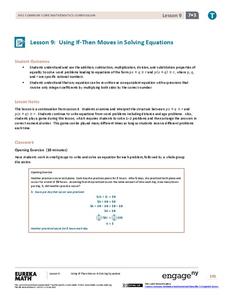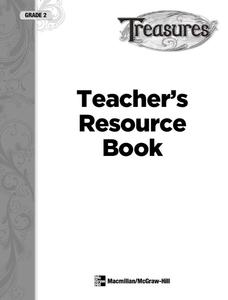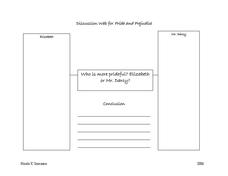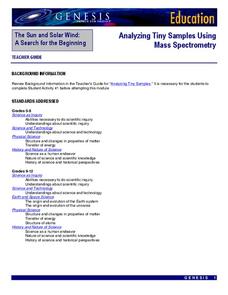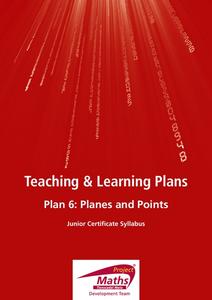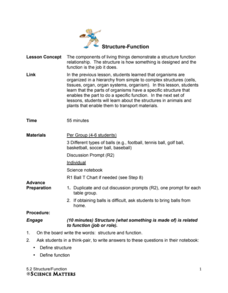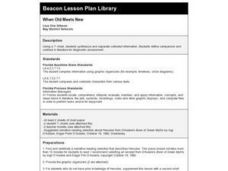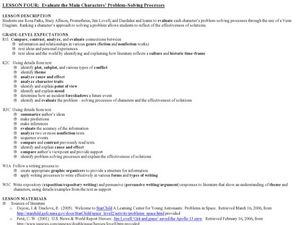EngageNY
Using If-Then Moves in Solving Equations II
Continuing from the previous lesson in the 28-part series, learners write equations to model problem situations. They then solve the problem by applying the properties of equality. In contrast to the previous lesson, they do not write...
Curated OER
Remembering the Fallen
A thought-provoking lesson showcases Civil War battlefield monuments to demonstrate how fallen soldiers are remembered. High school scholars compare Union and Confederate monuments to learn how each group commemorated the battles. They...
Smithsonian Institution
The Soldier’s Experience—Vietnam versus World War I
The Vietnam War and World War I were two very important—and different—wars. To understand the differences, and similarities, class members watch videos, examine primary source documents, and then create a newscast that examines the...
McGraw Hill
Phonics Teachers Resource Book
Looking to improve your classes literacy program? Then look no further. This comprehensive collection of resources includes worksheets and activities covering everything from r-controlled vowels and consonant digraphs, to the...
Curated OER
Twisting Versions of Little Red Riding Hood
Students read orally two versions of Little Red Riding Hood (Classic and Cajun) They compare and contrast the two Little Red Riding Hood versions. Students create a concept map to demonstrate the comparisons/contrasts. They could also...
Curated OER
Make a Compare/Contrast Diagram
In this make a compare/contrast diagram worksheet, students use the drawing tools in a word processor to create a diagram by following detailed instructions for each step.
Curated OER
Comparing Two Poe Classics
Students read and discuss The Black Cat and The Tell-Tale Heart. In this poetry lesson, students construct a Venn diagram to compare and contrast two pieces of literature.
Lerner Publishing
Teaching Folklore
Wonderful worksheets and activities complementing six sequential lessons are what you'll find in this unit on folklore. Pupils create folktales using literary devices and included story starters, compare and contrast different...
Curated OER
Pride and Prejudice: Discussion Web
Both Elizabeth and Mr. Darcy have proud moments, but who is more prideful? Explore Jane Austen's Pride and Prejudice with a discussion web that compares both characters in a brainstorming graphic organizer. Each side provides...
San Antonio Independent School District
Ancient Civilizations
Here is a fantastic set of graphic organizers to accompany your study of civilizations such as ancient Egypt, Sumer, Assyria, and Persia.
EngageNY
Grade 11 ELA Module 4 Overview
The intricate craft of narrative writing can make a happy story feel exuberant or a sad story feel devastating. With 42 extensive lessons that include poignant discussion questions, standards-aligned self-reflections, engaging writing...
NASA
Analyzing Tiny Samples Using a Search for the Beginning Mass Spectrometry
Teach the basics of mass spectrometry with a hands-on lesson. The fourth in a series of six lessons explores how mass spectrometry measures the ionic composition of an element. Learners then compare and contrast relative abundance and...
Curated OER
Author Study: Cynthia Rylant
Explore the life's work of one of the great children's authors using this ten-lesson author study unit. After first performing some whole-group research into the life of Cynthia Rylant, the class goes on to read six different...
Project Maths
Planes and Points
Build a solid foundation on which to develop future concepts. Through a guided exploration, learners compare and contrast the characteristics of points, lines, planes, rays, and segments. They measure lengths and practice notation for...
iCivics
Step One: We've Got Issues
What is the most pressing issue in your community? The resource helps you and your middle schoolers begin the process of doing something about it! Learners compare and contrast two pressing issues in their local counties by reading two...
Science Matters
Structure-Function
Without structure, there wouldn't be function. Scholars examine the meaning of structure and function with a hands-on experience. Using balls from different sports, they compare and contrast their structures and then analyze how each...
Curated OER
A Graphic Scene
Third graders discuss the advantages of using various graphic organizers including Venn Diagrams and T-charts. They use the organizers to compare and contrast different versions of classic mythological stories.
Curated OER
Evaluate the Main Characters? Problem-Solving Processes
High schoolers read passages from several sources and evaluate the text for various criteria. In this problem solving lesson, students evaluate character problem solving processes after reading passages. They will use a Venn Diagram to...
Curated OER
This Place is Just Like the Other
Students write paragraphs that compare and contrast the geographical characteristics of Arizona and the Southwest region. In this geographical characteristics lesson plan, students complete a diagram and discuss how Arizona differs from...
Alberta Learning
Great City-states of the Renaissance
Acting as journalists on a team to determine the most influential city-state of Renaissance Italy, your young historians will research, discuss, and compare the rise of Venice, Florence, and Genoa, and their influence in shaping a...
Curated OER
Compare and Contrast Type 1 and Type 2 Diabetes
Students use graphic organizers to compare and contrast Type 1 and Type 2 diabetes. In this diabetes lesson, students are given information on the two major types of diabetes. They analyze how to compare and contrast the information.
Curated OER
Comparing and Contrasting Three Civilizations
Sixth graders compare and contrast ancient civilizations. In this research skills lesson, 6th graders use SMART Board programs to compare and contrast the economies, cultures, and geography of Mesopotamia, Egypt, and India.
Curated OER
The Outsiders Character Chart: Dally
In this The Outsiders character chart, students will evaluate Dally from several points of view. Students will evaluate how Dally looks, what he says, how he acts, what other characters think about him, and what the reader thinks about...
